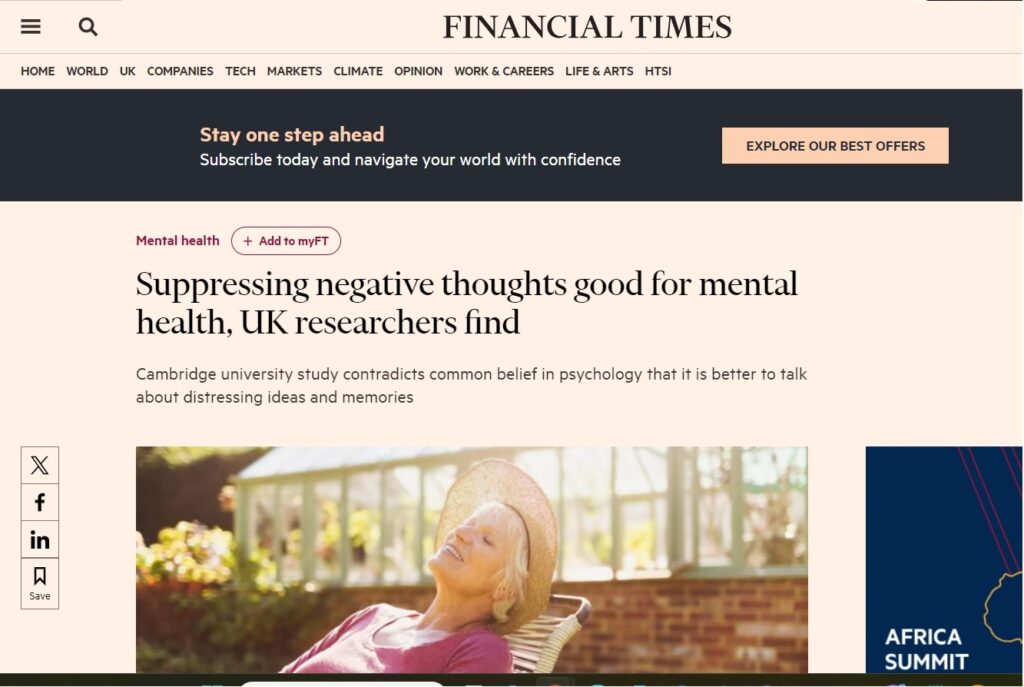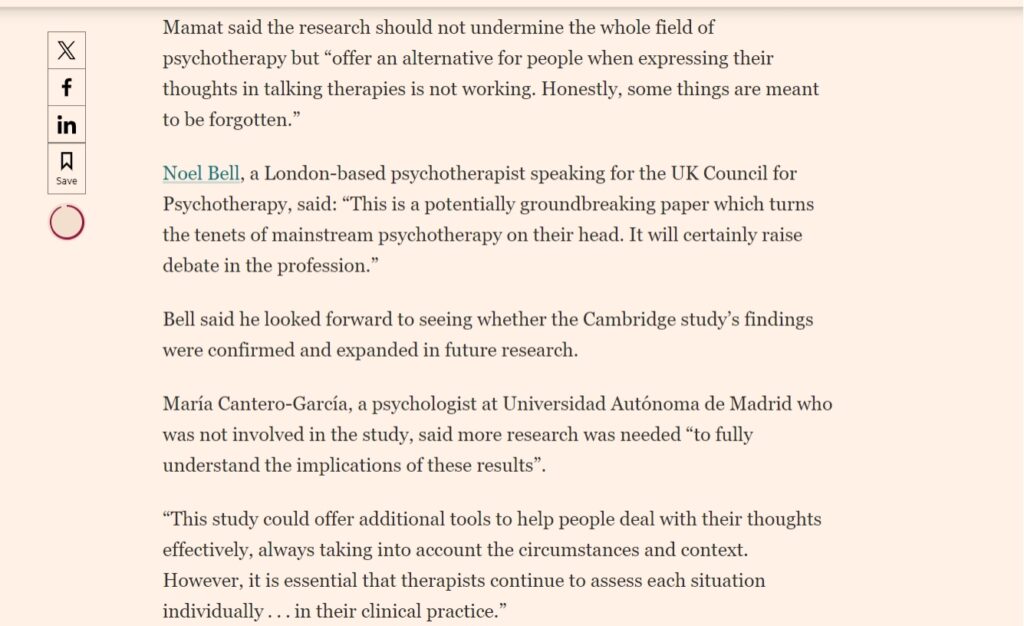Sometimes psychotherapy can be an easy target in wider society, and even in medical circles, when people believe we can be far too introspective and self-indulgent about sharing with others about what happened to us in our earlier life. Critics of psychotherapy claim that people like Prince Harry, for example, should get over their past hurts and not keep going over and over their past wounds ad-infinitum. People should keep a stiff upper lip, and display fortitude and stoicism in the face of adversity, and should practice self-restraint in the expression of emotion. These critics will point to others who deal with adversity in a quiet way, such as their grandparents, for example, who got on with their lives and didn’t end up going on and on about their trauma suffered in the earlier parts of their lives, such as experiencing the brutal of world wars and regional conflicts.

Recent research conducted by the University of Cambridge, that was funded by the Medical Research Council of the United Kingdom, and the Mind Science Foundation, might have reinforced the view that it is preferable to actually keep a stiff lip. The study found that suppressing negative thoughts may be good for our mental health after all. The research, led by Professor Michael Anderson, addressed an important issue: clinical psychological treatments that either suppress or accept negative thoughts. The findings claimed that the commonly-held belief that attempting to suppress negative thoughts is bad for our mental health could be wrong. Neuroscientists Zulkayda Mamat and Michael Anderson trained a cohort of 60 volunteers from around the world in online sessions over three days to block and, if possible, forget distressing thoughts. More information on the study can be found at Sciences Advances.

I was asked to comment on the findings of the study for the FT. Methodologically, several criticisms can be levelled at the study, around sample size and design, but I will leave those assessments for professional researchers to evaluate. I was more interested in the debate about whether thought suppression in itself was to be deemed a good therapeutic goal or if suppression represents a maladaptive coping process. Thought suppression has been practised for a number of decades on the basis of behaviour modification and is a specific psychological technique (or also referred to as ‘thought stopping’). It is considered to be an effective intervention, but only with certain non-intrusive and non-self-applied thoughts. In counselling and psychotherapy circles the technique is based on the application of verbal punishment immediately after the person thinks it, or says that they are thinking it. However, when these are self-intrusive, intrusive and intense thoughts, it is more difficult to make them go away.
Suppression of emotions must be seen in a nuanced way and in context. We can’t be angry all the time, for example, even if anger is a legitimate emotion in the moment. We suppress emotions to cope, sometimes to conform, or because we are told to in order to survive. We might also suppress emotions because we are shamed, or because we suffered from a traumatic event and the associated feelings are just too painful to process at that time. When we experience a crisis in our emotional life the question then becomes whether we need to process these difficult feelings, even if we have deeply repressed emotions in our bodies, or learn how to ignore them.
Much of the fundamental tenets of mainstream psychotherapy training is based on the belief that transformation comes about not from suppression but from active engagement with difficult feelings (notable exceptions might be aspects of Acceptance and Commitment Therapy (ACT), Mindfulness-Based Therapy (MBCT) and Dialectical Behaviour Therapy (DBT), which have particular approaches to thought suppression. Eye Movement Desensitization and Reprocessing Therapy (EMDR) does not erase memories and nor uncover “repressed” memories (Lebak, 2018). It only helps reprocess the current memory).
My experience of going through extensive psychotherapy training is that a trainee was encouraged and supported to uncover and enter into dialogue with their own difficult thoughts and emotions. This is a fairly obvious statement to make especially with reference to experiential training institutions. This then influences a trainee’s style of practice and ongoing professional development. Thought suppression was generally considered to be dysfunctional and emotionally avoidant, and might actually represent resistance to robust therapeutic enquiry. The implied assumptions in the teaching and learning ethos was that suppression of thoughts and emotions leads to depression, residual anger, and illnesses. If the unprocessed thoughts and emotions are not sorted and end up swirling around in the body then there will be maladaptive consequences for the individual.
This proactive engagement with the processing of difficult feelings is perhaps what Professor Anderson was referring to when the press release from the University of Cambridge (that accompanied the release of the study’s findings) quoted him as saying that the “whole point of psychotherapy is to dredge up these thoughts so one can deal with them and rob them of their power”. This statement will antagonise many in the psychotherapy profession. I believe Professor Anderson can have a point if therapy is not practiced in a nuanced way and not in context. For me, the processing of past hurts, mixed emotions and difficult feelings can helpfully lead to a greater awareness of one’s triggering process. So, the therapy is not needlessly dredging up past thoughts and feelings in a driver-less journey of self-indulgence. Effective therapy means actively addressing, when safe to do so, one’s difficult thoughts and feelings so as to break free from negative thought patterns. This can help an individual to gain greater insight into their behaviours and how they fall victim to perpetual self-defeating coping strategies. This is a process and comes about not by thought suppression but from proactive dialogue with parts of self.
Effective therapy, therefore, also potentially empowers a new way of living for people in accessing their own personal resources in order to deal with the triggering associated with the activation of their nervous system. This process initially comes about, not by thought stopping, but by proactive engagement in mining the source of difficult feelings. This means not keeping a stiff upper lip. The key to this debate is the distinction between healthy suppression and unhealthy avoidance.
In fairness to Professor Anderson, his study was primarily dealing with cases of mild anxiety, not deep trauma. The authors of the findings further acknowledged that suppression training may harm those with anxiety, depression, and posttraumatic stress. They were aware that pathological worry, rumination, and intrusive memories in these aforementioned conditions are often attributed to neurobiological deficiencies that may be difficult to rectify with training. That said, the findings showed that participants reporting higher trait anxiety and post-traumatic stress apparently benefited the most from suppressing their distressing thoughts.
Thought suppression might, however, have a place when transformational healing has taken place and a maintenance of positive thinking might include blocking thoughts in order to guard against relapses to old ways of thinking and behaving. This could be when suppression is healthy. The study could provide therapists with some useful interventions and tools to help with an understanding of negative thought suppression and help people deal with their thoughts and feelings more effectively. However, good ethical practice requires therapists taking into account the circumstances and context of presenting material. This means assessing each situation individually and to consider the limitations and complexity of this issue in their clinical practice.
This whole area of whether or not thought suppression works is part of a wider tension about how to prove clinical effectiveness with psychological interventions. Some researchers will claim to prove empirically based ‘experimental psychology’ effectiveness where hypotheses and theories can be tested to see if they can be replicated. Psychological interventions are very difficult to test and to prove, in spite of the apparent evidence for some interventions. The part of a therapist skill is perhaps knowing when to address and when to explore issues with someone, and when to maybe leave them be. In this a therapist is guided as much by anecdotal evidence as by evidence based interventions.

Noel Bell is a UKCP accredited psychotherapist based in London and can be contacted on 07852407140 or noel@noelbell.net.
Professor Anderson seems anti therapy.